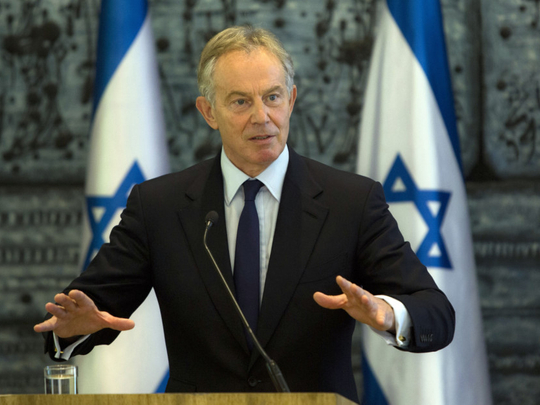
Having announced his resignation as Middle East envoy, Tony Blair jetted into London on Wednesday night to take up his new role as the Labour Party’s mediator to Middle Britain.
In the Middle East, the former prime minister had entered a conflict zone where warring factions sniped constantly at each other; where no one really wanted him there; where he was seen as too close to one side; and where many held him responsible for the problems he was trying to resolve. It was the perfect training ground for his mission to the Labour Party.
Blair is said to be energised by the challenge.
Not only is there a job to be done, but there are also plenty of oligarchs in London he can hang out with in his downtime. His first task will be to improve the hopeless economic situation of Britain’s opposition party. He will seek to break the dependence on the funding of union warlords. This may be difficult, but he is confident he can “put the party in touch with a few people”.
New mission
Not everyone will welcome his new mission — many in the Labour movement say the last thing it needs is advice from the only man ever to lead it to three successive election victories — but the party could use assistance.
In just three weeks it has become the world’s forgotten conflict zone. At the start of the month, voters were hanging on its every utterance; now the battle is raging but the British public has tuned out.
Long-running scores are now being settled, if not with violence then at least with discourtesy. Its most promising leaders have either been toppled or, facing factional infighting, fled into exile. New potential figureheads are gunned down in a hail of unattributable briefings. Its great cities lie in ruins; and celebrities like Bilbo Baggins and Alan Partridge, who were once all too keen to lend their name to the cause, now find they have other commitments. Blair will find an organisation where radical trade unionists have secretly tunnelled under the roots of the party to take out any candidate who betrays the twin heresies of charisma or a desire to win back lost voters.
It stands split between four rival camps, each led by someone barely recognisable to the public and without even the benefit of a close relative they can overthrow to secure the job.
Many of its potential leaders are now in thrall to the extreme teachings of Guardian columnists such as the radical preacher Owen Jones, who claim that Labour’s failures are the result of its lack of hardline socialism and that it needs to be more like Spain’s Podemos party.
They used to say it should be more like Syriza, but the Greek governing party seems recently to have lost some of its lustre.
In Scotland, Labour has been chased from all its power centres by resurgent nationalists.
The fear of nationalist insurgents elsewhere forced many potential supporters to turn to regional strongmen such as Prime Minister David Cameron — a man they do not really like, but who has at least never purchased a Proclaimers album. Others have been seduced by English nationalists such as Nigel Farage, the former, present and future leader of the United Kingdom Independence Party.
Persuasion skills
In Palestine, Blair secured an early success in bringing competition to the mobile phone market; and, though this did not bring peace any closer, some of the apps now available for download on the West Bank are bang on.
Allies say he may do something similar with Labour’s economic infrastructure, though deteriorating relations with Sky Broadband mean he may look to Virgin for a communications solution.
Blair’s problem will be persuading militant Labourites to abandon the literal interpretation of sacred texts and to embrace and compromise with the modern world. He must persuade them not to align behind a new warlord who will defy major western powers such as the Murdoch press, big business and anyone who lives south of Sheffield. Fortunately he knows a number of terrific outside organisations, such as the Tony Blair Faith Foundation or Tony Blair Associates, which he can bring in to help.
Friends say he is enthused but philosophical about his new role. “He knows not everyone is going to want to hear what he has to say. But if things get too desperate he could always go back to the Middle East.”
— Financial Times







